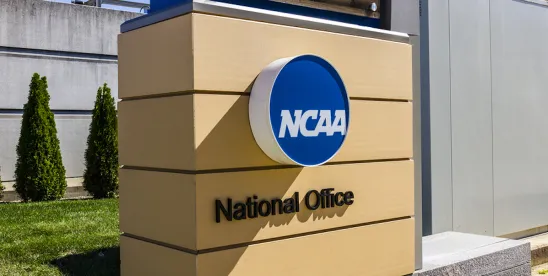The National Collegiate Athletic Association (NCAA) will stop enforcing rules restricting Division I athletes from transferring from one institution to another under a consent judgment filed in an antitrust lawsuit brought by the U.S. Department of Justice (DOJ), ten states, and the District of Columbia.
Quick Hits
- As part of a proposed consent judgment to resolve an antitrust charge brought by the DOJ and several states, the NCAA agreed to drop its rule requiring certain Division I college athletes who transfer schools to sit out a year.
- The DOJ and the states alleged that the transfer rule unlawfully restricted athletes from engaging in the market for their labor as college athletes.
- This litigation highlights state and federal regulators’ use of antitrust laws to reign in restrictions imposed on individuals and employees seeking to take advantage of economic opportunities or benefits.
- The NCAA agreed to pay the plaintiff states’ attorneys’ fees and costs in prosecuting the lawsuit.
On May 30, 2024, the parties filed a joint motion for the entry of a consent judgment and permanent injunction to resolve an antitrust lawsuit alleging that the NCAA’s transfer eligibility rule “unjustifiably restrain[ed] the ability of … college athletes to engage in the market for their labor as NCAA Division I college athletes.”
Specifically, the lawsuit alleged that the NCAA’s enforcement of its transfer eligibility rule—which prohibited certain transferring athletes from participating in NCAA competition for a full academic year at their new institutions—was an “illegal agreement to restrain and suppress competition” in the labor market for athletic services in men’s and women’s Division I sports that “unlawfully restrain[ed] the ability of Division I college athletes to transfer to other Division I schools without loss of athletic eligibility.”
In this restraint of trade lawsuit under Section 1 of the Sherman Act, the plaintiffs alleged “the [t]ransfer [e]ligibility [r]ule is a no-poach agreement between horizontal competitor member schools that serves to allocate the market for the labor of NCAA Division I college athletes” and claimed the rule “violates the Sherman Act because it has direct anticompetitive effects that harm college athletes and consumers of college athletics.”
“Free from anticompetitive rules that unfairly limit their mobility, Division I college athletes will now be able to choose the institutions that best meet their academic, personal and professional development needs,” Assistant Attorney General Jonathan Kanter of the DOJ’s Antitrust Division said in a statement. “This resolution is a testament to the benefits of federal and state enforcers working together to ensure free markets and fair competition for all Americans.”
NCAA Transfer Rule
In January 2024, the DOJ, three states—Minnesota, Mississippi, and Virginia—and the District of Columbia joined this case that was previously filed by seven states—Colorado, Illinois, New York, North Carolina, Ohio, Tennessee, and West Virginia—in the U.S. District Court for the Northern District of West Virginia, alleging the NCAA’s enforcement of its transfer rules violated Section 1 of the Sherman Antitrust Act of 1890.
In December 2023, the district court issued a temporary restraining order, which it later converted to a preliminary injunction, blocking the NCAA’s enforcement of the transfer eligibility rule. Subsequently, in April 2024, the NCAA Division I Board of Governors voted to withdraw the transfer eligibility rule and to allow athletes to transfer freely.
The DOJ and the plaintiff states targeted the NCAA’s transfer eligibility rule—NCAA Bylaw 14.5.5.1—which had deemed transfer athletes from four-year institutions ineligible for intercollegiate competition at other NCAA member institutions until they had “fulfilled a residence requirement of one full academic year (two full semesters or three full quarters) at the certifying institution,” known as the “year-in-residence requirement.”
The transfer eligibility rule did not prevent an athlete from practicing with the athlete’s team or participating in other team activities, but it prohibited the athlete from participating in games or competitions. Under a first-time-transfer exception, NCAA Bylaw 14.5.5.2.10 exempted athletes from the year-in-residence requirement for their first transfer. Otherwise, athletes were required to seek a waiver from the NCAA to be eligible to compete in NCAA events immediately after a transfer.
The lawsuit further targeted the NCAA’s rule of restitution—NCAA Bylaw 12.11.4.2—alleging it deterred athletes from challenging the NCAA’s transfer rules in court. The rule allowed the NCAA to impose additional punishment on an athlete and the athlete’s institution if the athlete brought a legal challenge to the NCAA’s eligibility rules and obtained an injunction that enabled the athlete to play immediately upon transfer, but only when that injunction was later overturned or stayed.
In recent years, college athlete transfers have become more common with the first-time transfer exception and the grant of waivers as athletes have sought to maximize their potential benefits from name, image, and likeness (NIL) agreements or maximize their playing time.
Alleged Anticompetitive Effects
According to a competitive impact statement filed by the DOJ, the NCAA’s transfer eligibility rule unjustifiably restricted college athletes from taking advantage of the benefits of playing college sports, including NIL deals, their exposure to professional scouts, and the opportunity to compete against other elite talent.
The rule discouraged athletes from transferring, made second-time transfers less attractive to other schools because of the year-in-residence requirement, and denied the benefits of competing in college athletics to those affected by the year-in-residence requirement, the DOJ alleged. Further, the rules lacked any procompetitive justification, the DOJ alleged. Specifically, plaintiffs claimed that because of “the anticompetitive effects of the [t]ransfer [e]ligibility [r]ule … , the burden must shift to [the NCAA] under the rule of reason to provide procompetitive justifications for the [t]ransfer [e]ligibility [r]ule,” a burden they alleged the NCAA could not meet.
The NCAA had argued that the transfer eligibility rule promoted academic success by limiting potential disruptions to college athletes’ studies that might be caused by multiple transfers. However, the district court rejected that argument in granting the temporary restraining order on the transfer rules, finding that, regardless, during the year-in-residence, athletes trained and participated in other team activities that took time away from their studies.
The DOJ also pointed to the NCAA’s other academic eligibility rules that already serve as less restrictive (and ostensibly lawful) alternatives for the NCAA’s goal of promoting college athletes’ academic progress.
Proposed Consent Judgment
The proposed consent judgment would permanently enjoin the NCAA from enforcing its transfer eligibility rule or any similar rule requiring transfer athletes to meet a year-in-residence requirement, and it would enjoin the NCAA from enforcing its rule of restitution against any athlete or member institution related to an athlete’s participation in NCAA competition following a transfer.
The proposed consent judgment would apply to NCAA Division I college sports, including Division I Football Bowl Subdivision (FBS) football, the highest level of college football in the United States, and men’s and women’s college basketball.
The NCAA would also be required to provide an additional year of eligibility to any Division I athletes deemed ineligible under the transfer eligibility rule for a sports season or portion of a season since the 2019–2020 academic year.
Key Takeaways
The past few years have marked a period of upheaval for the NCAA driven by several antitrust challenges to various amateurism and eligibility rules. The proposed consent judgment prohibiting the NCAA from enforcing the transfer eligibility rule and rule of restitution comes a week after the NCAA and major athletic conferences agreed to settle a separate antitrust class action from college athletes alleging that the NCAA’s rules denied them from benefiting from their NIL rights during their college sports careers.
More broadly, the DOJ decision to join the plaintiff states in challenging the transfer rule lawsuit highlights the DOJ’s focus on using federal antitrust laws to target rules or restrictions that arguably limit individuals or employees from taking advantage of various economic opportunities or benefits. This case is also illustrative of the growing number of lawsuits that focus on the much more infrequently litigated “labor market” side of the antitrust laws, as well as monopsonies over the labor market. Moreover, the proposed consent judgment comes just weeks after the Federal Trade Commission (FTC) published a final rule that effectively bans noncompete agreements between employers and workers.





 />i
/>i

